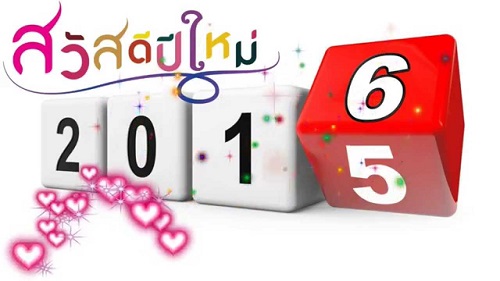In Thai

สวัสดีปีใหม่ 2559
Please follow me down the rabbit hole because at the other side you’ll be able to use (and hear and understand) this expression for wishing your Thai friends a Happy New Year or any other happy festive day.

Think of doing something physically enjoyable that makes you SWEATY like a pig (don’t tell me what it is, I don’t want to know)! You feel really good, right?
สวัสดิ์ (“s-wud”, rhymes with “hut”) is a Sanskrit word that means well-being, or “there is goodness” (“su” is good, “vasti” is “there is”). ดี (“dee”) means good (vitamin D is good for you). It’s what you say when you greet or leave someone, exactly like “shalom” in Hebrew: “peace be with you”.
So you tell someone to feel real good ‘n SWEATY whenever you meet and depart.
As for the New Year, we say it like the French: “year new” (“car red”, “girl pretty”, etc.). It takes a year to roll a PEA from Bangkok to Chiang Mai with your nose, just be careful not to SPEED. ปี (pea) is “year” in Thai.
 And like a happy pig-in-shit, you won’t have a happier experience than wallowing in a slippery mire of sweaty pea soup. Oh MY… that’s something of a new experience for you, right? (So sad…) ใหม่ (my), said with a low sad tone, means “new”.
And like a happy pig-in-shit, you won’t have a happier experience than wallowing in a slippery mire of sweaty pea soup. Oh MY… that’s something of a new experience for you, right? (So sad…) ใหม่ (my), said with a low sad tone, means “new”.
After getting all sweaty, wallowing in a messy PEA MIRE is something you should do every year on New Year’s day. It’s a great antidote for a hang-over!
 |
Important: Pronounce “p” the same way as the “p” in “speed” – the air is kept inside your mouth, not expelled as a puff.
Also, it’s important to drop your voice and feel sad (as in “uh oh…“) when you say ใหม่ (MY). Then it means “new”, not “burnt” or “wood” or “silk”, etc. In colloquial speech, it doesn’t really matter about the other tones. |
So to wish your friends a Happy New Year, say:
สวัสดีปีใหม่ นะ
(s-wud-dee pee my, na!?)
– na!? (said with a quizzical, uncertain intonation) at the end is just to be light-hearted and polite
ช่วยให้ยาลดลง
(helping the medicine go down)
ยาสระผม and ยาสีฟัน
ยา means drug, medicine, cream, ointment, medical substance, or even product (e.g. for washing up liquid or mosquito coils)
สระ has two meanings, depending on how you pronounce it.
If you say สะ (dropping the ร) then it’s to rinse (and in the context of hair, it’s to wash the hair). It also refers to a pool of body of water like a swimming pool or lake.
ผม literally means “hair”, but is also used as a masculine “I” (probably because people of lower status would always keep their heads lower than people of higher status)
If you pronounce สระ as สะ-ระ (by adding in the bridge/spacer vowel) then it means “vowel”. So สะ-ระ อา means the า vowel.
ยาสระผม is shampoo, but everyone says simply: แชมพู (you’ll see this on shampoo bottles too)!
สี has two meanings also:
1. colour (on its own it’s just colour, but if you specify a colour like สีดำ then it is the colour itself: not “black colour” but just “black”)
By association, its also means to paint (a colour) onto something. สีบ้าน “to paint the house”
2. When it’s part of a compound word, it means to rub or scrape, so the most obvious one would be โรงสี which is a structure that rubs things (a mill).
Together with ขัด (“go against something”), it means to scour or scrub (ขัดสี)
And of course ยาสีฟัน is a substance [to aid in the] rubbing of teeth (toothpaste).
A แปรงสีฟัน is a brush for rubbing teeth (toothbrush).
Now, here are some interesting idiomatic expressions:
เสียดสี is to pierce/scrape (เสียด is to pierce or thrust into something, like a needle into your skin) – and the idiomatic meaning is to
be sarcastic or satirical (more the latter than the former).
ป้ายสี literally means to scrape a sign, but it’s used idiomatically to slander someone.
Finally สีลม means a windmill, and I can’t figure out why (scrape the wind?)
